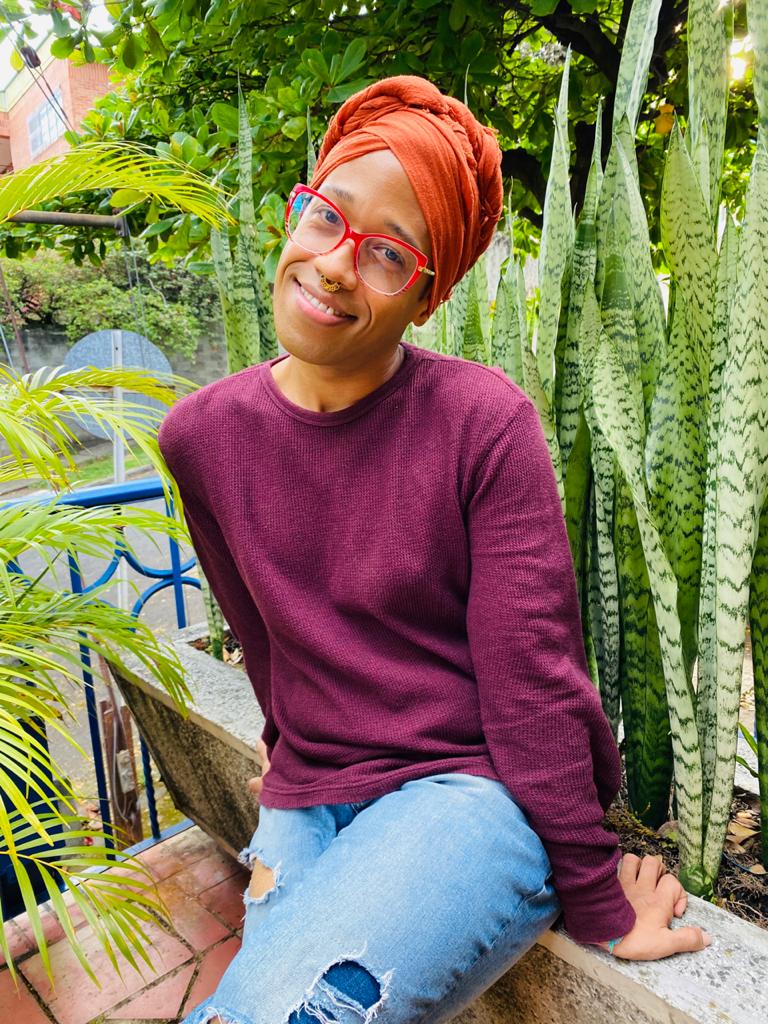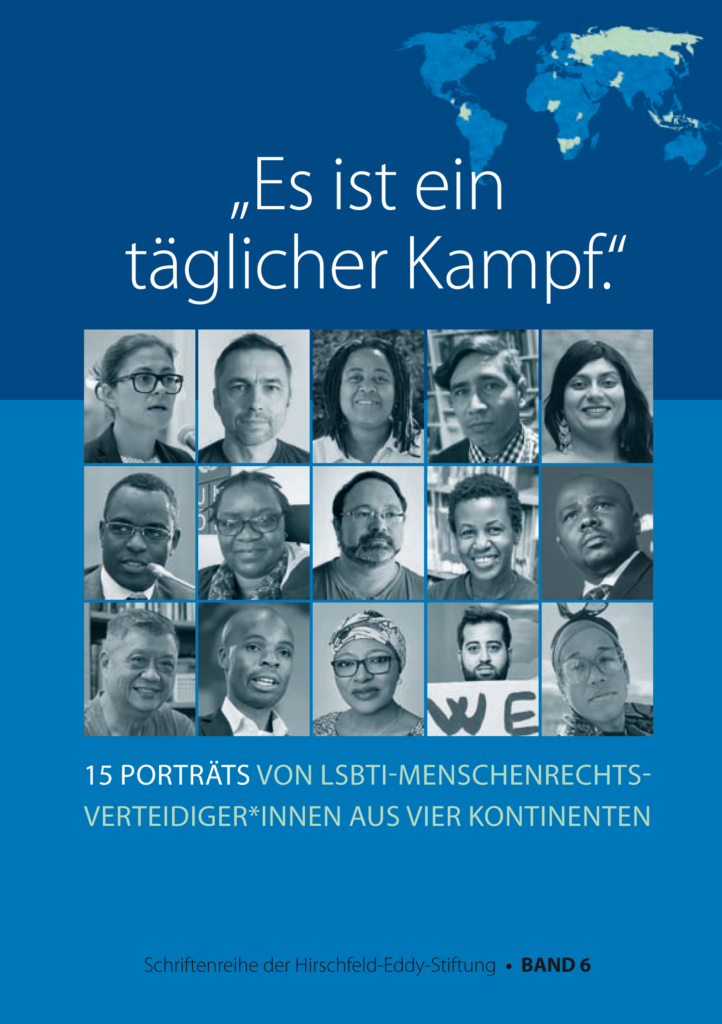Mauri Balanta Jaramillo (34) is a human rights activist from Columbia. In all of her work – not only as a social scientist and filmmaker but also as director of communications and information management for Casa Cultural El Chontaduro in the eastern part of Cali – she promotes equal rights for different ethnic groups and political emancipation for Black youth, women and LGBTIQ+ people.
Translated from Hirschfeld Eddy Foundation series volume 6 “15 Portraits of LGBTIQ+ human rights defenders” (2021): download or order free of charge (in German) here.
It was no accident that Mauri Balanta Jaramillo chose the career path she did. She herself faces three forms of discrimination: she is Black, a trans woman, and from a working class family. The resulting experiences have influenced her life and choices in key ways. She was born in the city of Pasto in western Columbia in 1987. At the age of 3 she moved with her family to Cali, the country’s third-largest city after Bogotá and Medellín, where she lives today. “I grew up on the east side, an area marked by social injustice which has been home to most of the Black people who have come to the city,” she says.
When she was 5 her mother migrated to the USA in search of work, which Columbians not infrequently do in light of issues such as violence, forced displacement, and a lack of educational and work opportunities. In this case her mother wanted to improve the future prospects of her two children. But her decision came at a high price: young Mauri did not see her mother for 13 years, and grew up under the care of her father, grandmother and sister.
Balanta Jaramillo recalls being an outgoing and affectionate child who was considerably more interested in music and dancing than football. She was friends with many of the girls in the neighbourhood. They held dancing and singing contests, and shared a passion for the Spice Girls. Balanta Jaramillo refers to that time as her “first feminist school”, and found it more difficult to relate to boys.
Her first death threat came at the age of 7, an experience she describes as the worst in her life. “I was playing with one of my few white (male) friends, when his father, a policeman, approached us and ordered him to go home,” she recalls. “Then, looking at me with utter disdain, he said, ‘If I ever hear that you’ve touched my son’s penis I’ll cut off your hand and kill you, you black fag!’ ”
Balanta Jaramillo already had effeminate qualities as a boy, which became more prominent in puberty. Her appearance was androgynous, and “I liked to play with that”. She was bullied at school and in the neighbourhood for her appearance and non-conforming behaviour. As she recalls, “In high school I embodied three places of hatred: being black, fat and queer.” Although not easy to bear, she did so with dignity.
Balanta Jaramillo always saw herself as feminine. “My femininity was something I could never hide from people, even if certain circumstances led me to consider it,” she says. She never had to go through an official coming-out. Her grandmother and father preferred to be silent about her identity, yet were very embarrassed by the macho comments from family members and neighbours. This weakness, or inability to stand with her through thick and thin, made Balanta Jaramillo depressed. But her sister was always a great support in the process of coming to love and accept herself the way she was. Over time things improved, especially as she became more independent. “Today my family is quite open, respectful and very proud of the person I have become,” she says.
In the absence of other options, Balanta Jaramillo identified in her youth as gay. In retrospect that seemed to fix her in a category she was actually seeking to escape. When she encountered queer theory at university, she found possibilities beyond the roles, portrayals and performativities of gender binarism. Four years ago, she began her gender transition and adopted the pronoun “she”.
Inspired by her studies and work
Balanta Jaramillo’s university studies opened up new paths and ultimately a new universe. She discovered different views and forms of resistance. The meta-perspective gave her a better understanding of her own situation. She examined Black feminism and intersectional analyses, including how racism, sexism and homophobia can be directed simultaneously to one and the same person. It is very difficult for Black people in Columbia to acquire higher education. Only 13 percent of the country’s students are Afro-descendant, and only 3 percent of its graduates. “Mine is a typical case for young Black people. We finish high school and realize our parents don’t have the money to fund our studies and that it’s time for us to work to help support our families,” she says. State universities are the only low-cost option, but they have few places available and it’s hard to get in. Although Balanta Jaramillo went to a fee-paying high school, her chances for university admission were low so she first had to work.
She was 23 when she began attending Cali’s Universidad del Valle, in the evening because she needed to earn money during the day. She studied educación popular – a subject combining sociocultural studies, political science and communications as means for social mobility. She concentrated on communications, the area in which she is active today. A grade-based scholarship was helpful in completing her studies, and she also was a teaching assistant for different professors and a research associate on various projects. “For Black women every step is a struggle”, she says. “That Afro-feminist slogan practically became my mantra during my studies.”
Another milestone was when she began working for the El Chontaduro cultural center in 2012. She had already joined forces with other young people in a communications collective. Its members, all of whom had suffered serious discrimination as poor Black youth from eastern Cali, sought forms of critical dialogue and community integration. These experiences, combined with hunger, violence, criminalization and a lack of protection and opportunities, led them to examine their situation and take a stand.
Casa Cultural El Chontaduro is located in the eastern part of Cali, in the district of Aguablanca. Founded 35 years ago, it seeks to empower the local population with a special emphasis on Black children, youth, women and LGBTIQ people. It offers theatre, music, dance and capoeira classes for children, and preparation for university admission exams. It helps women address experiences of violence with the help of literature workshops, performance courses and video forums. The months of July to October are full of festivals and cultural gatherings. It also holds seminars, conferences and other events on the topics of race, gender and sexuality, which Balanta Jaramillo attends. She is part of an activists’ research group connected with El Chontaduro, which looks at intersectionality and collaborates with the Center for Afrodiasporic Studies at the Universidad Icesi in Cali.
Balanta Jaramillo also directs the center’s communications department. She is the contact for local, national and international media, generates social media content, and makes documentaries with a focus on resistance by the Black population of Cali. One is a short film about her quarter’s protests in connection with the national strike from late April to July 2021. Balanta Jaramillo herself took part in the protests. The strike highlighted the indignity under which Black people live in the different territories of Columbia. “Most of the people killed in Cali’s protests have been young Black people from the eastern part of the city. The death of our Black children and youth continues to be a systemic reality and is looked upon with total indifference by the rest of the population,” she says. Evoking the British geographer David Harvey, she describes the strike as a “moment of creative destruction” by which the dispossessed openly claim the right to cities and territories, in an attempt to live in dignity and with social justice.
Balanta Jaramillo dreams of writing a doctoral dissertation. She is drawn to interdisciplinary areas such as gender studies, Afro-Latin American studies and Black-Brown-Queer studies. One motivation is the firm belief that her struggle is epistemic, or rooted in the theory of knowledge. “We need more Black, queer and south-global intellectuals to help position our Afrodiasporic thinking and dismantle the narratives of patriarchal and colonial domination,” she observes. But she would also like to continue making films and inspiring more people to collectively dream and build a better world.
She especially supports women, children and Black LGBTIQ+ people in eastern Cali, Columbia and the rest of the world who are fighting for their rights, and she places a premium on commonalities in Black collectives’ struggles against social inequality throughout the world. Solidarity among these activists is of great importance to her, as is networking about forms of creative resistance. An especially positive experience in this light was an invitation by Harvard University to a workshop in 2019 on Radical Networks in the African Diaspora: Black Women’s Resistance in Latin America Today. She found it very inspiring to come together with Black women from around the world, and calls for such networks to be strengthened and expanded.
Ingrid Wenzel
15 Portraits of LGBTIQ+ Human Rights Defenders:
| Cesnabmihilo Dorothy Nuhu Aken’Owa Nigeria | Mauri Balanta Jaramillo Colombia | Ali Bousselmi Tunisia |
| Tash Dowell Zimbabwe | Irene Garoës Namibia | Jean Elie Gasana Rwanda |
| Julius Kaggwa Uganda | José Ignacio López Nicaragua | Andriy Maymulakhin Ukraine |
| Frank Mugisha Uganda | Dédé Oetomo Indonesia | Lilith Raza Pakistan/ Germany |
| Monica Tabengwa Botswana | Dragana Todorovic Serbia | Mikhail Tumasov Russia |
A publication by Hirschfeld Eddy Foundation as part of the project: LGBTIQ+ Human Rights Defenders. Find all events relating to this project here and all articles via the Tag MRV-2021 in this blog.




